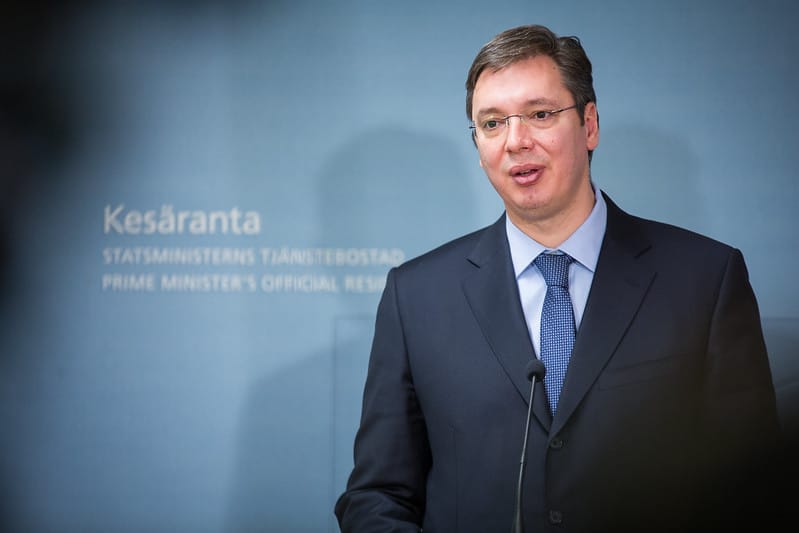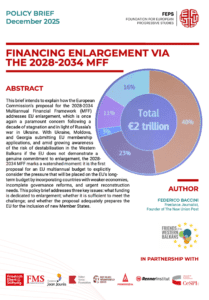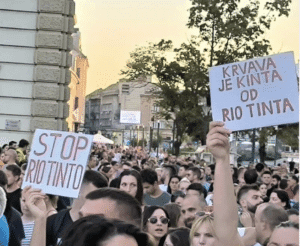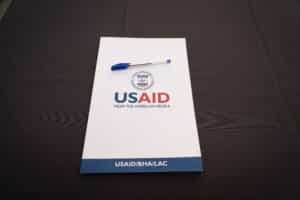Photo: Aleksandar Vučić in 2015 – Finnish Government/Flickr
On 17th of December, parliamentary and local elections were held in Serbia. They are widely analyzed as unfair and unfree. The snap elections were called for after two deadly shootings occurred in the country in May. After the shootings and the subsequent protests, oppositions parties called for elections and President Vučić agreed to his. Analysts tend that these early elections are part of a wider strategy in which the incumbent president Aleksandar Vučić and his SNS party are trying to buy time in the normalization of ties with Kosovo, but that he is also trying to bolster support for his party that has become less popular after the shootings.
Major opposition parties joined their forces and decided, as in 2021, to have a joint list. This list, called Serbia Against Violence, consist of several pro-European parties. They polled relatively high the weeks prior to the elections, around 25,6 percent nationwide. Especially in Belgrade there seemed to be a chance of winning the local elections for the opposition parties. Belgrade is an import constituency to win, not only because it’s of great importance economically, but also because almost 1 in 4 voter lives in Belgrade. Vučić list polled around 39 percent.
Results
Even though the polls predicted a somewhat tight race between the SNS list and the SNP list, after almost all votes haven been counted the results show a controversial win of the SNS list. Vučić list won almost 47 percent of the votes, while the parties on the SPN list scored around 23 percent. The SNS won 128 seats in parliament, giving them an absolute majority in the 250-seat parliament. Other parties that have met the electoral threshold are the SPS/JS, a combination of a center-left and right wing party who supported the last Vučić government. Also the NDSS/POKS, a list of national conservatives who want to reinstate the monarchy, got into parliament. The MI-GIN list, led by Branimir Nestorović who is an anti-vaccination supporter and flat earther, obtained enough votes to meet the threshold. Some ethnic minority lists also obtained seats, as they don’t have to meet the threshold.
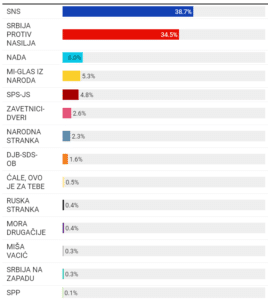
Belgrade
The race in Belgrade was more tight, with Vučić’ list scoring around 39 percent in the preliminary results. The SPN received over 34 percent of the votes in Belgrade. The MI-GIN list came in third, but has already said that they will not form a coalition with either the SPN or the SNS. This means there will likely be a new round of elections. Also, the SPN list has asked for new elections in Belgrade, as they accused the government of fraud. Marinika Tepic and Miroslav Aleksic, two leaders of the Serbia Against Violence alliance have announced a hunger strike in protest at what they say was electoral fraud.
Irregularities and fraud
First of all, the elections were not free because large parts of the media are controlled by the government and thus Vučić. For example the public broadcaster is completely controlled by Vučić and only airs pro- Vučić footage. Opposition parties are unable to convey their views to the public. Next to this, media reported that thousands of people in state institutions and companies have been pressured not only into voting for them but also in participating in the election campaign. Refusal can lead to a sudden transfer of office or in being fired.
‘Bulgarian Train’
Also, during the election day observers have witnessed large scale election fraud. The fraud was commited in two ways. The first one is known as the ‘Bulgarian Train’, called after large-scale election fraud during the European elections in Bulgaria in 2009. It is a method of vote-rigging with the goal of influencing the election process through the control of ballots. Observers have seen multiple accounts of the method during the election. The process starts when political ‘handlers’ distribute pre-filled ballots in front of polling stations. Voters who are willing to sell their ballots take a pre-filled ballot into the polling station, where they obtain empty ones, and cast their pre-filled ones. Then, the voter goes back outside and hands the empty ballot to the handler, who fill them in and give them over to the next voters. Observers who captured the process on video, where attacked when they tried to report the misconduct to the police. While filing a report in the police station, their car was demolished in the parking place.
Foreign voters
Another method the government used, was the mass influx of foreign voters, who have double citizenship and are thus eligible to vote. People from Kosovo, Montenegro and Bosnia Herzegovina were transported in busses by the Serbian government to cast their votes in Serbia. People who have double citizenship are only allowed to vote in the parliamentary elections, not in the local elections, but observers have seen a lot of violations. An important aspect of this, is the endorsement Vučić got from his foreign allies. During his victory speech, he was joined on stage by Milorad Dodik, the president of the Republika Srpska, and Andrija Mandic, president of the parliament of Montenegro. Their presence is a support for Vučić’ nationalistic discourse of the ‘Serbian World’ in which borders are relative. By this he can show to his voters that if he calls on Serbs in the region to come and vote, they will. This is a threat for democracy in Serbia.
International reactions
Multiple foreign officials have slammed the irregularities in the vote. Viola von Cramon, member of the observation mission of the European Parliament said: “We absolutely expected higher democratic standards from an EU candidate country, which negotiates EU membership”. The International Election Observation Mission, which included members of the OSCE stated the elections were marred by ‘isolated instances of violence, procedural irregularities, and frequent allegations of organizing and busing of voters to support the ruling party in local elections.’ The German foreign office took a firm stance on X, referring to the OSCE report, saying that misuse of public funds, intimidation of voters and vote buying are unacceptable for a country with EU candidate status.
Re-watch our event on the elections!
Want to know more about the upcoming elections? The Foundation Max van der Stoel organized an event on the election in which they held a panel discussion with Nevenka Tromp (University of Amsterdam), Thijs Reuten (MEP) and Geert Luteijn (Vrije Universiteit Amsterdam). You can watch the discussion here.
Written by Ype Verhagen
